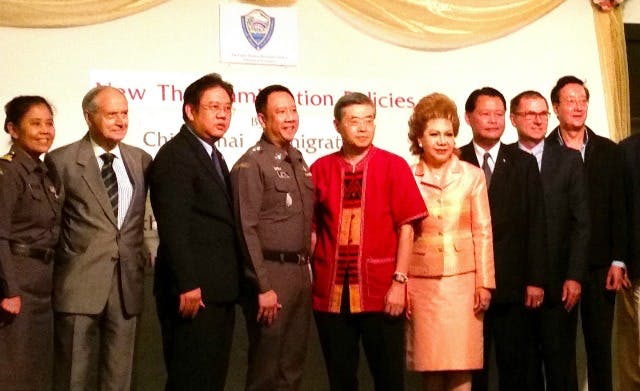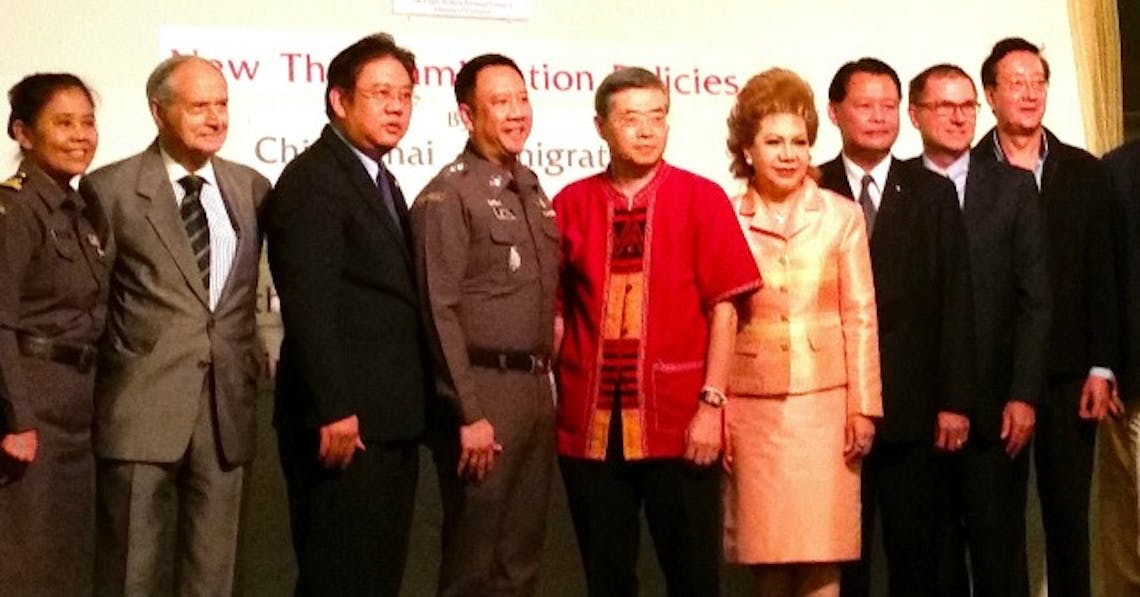Correction: We originally reported that funding for a new immigration office in Chiang Mai had been approved. This is incorrect. The plans have been submitted to national immigration chiefs and are currently awaiting approval.
CityNews – A seminar on the new immigration regulations was held at the Imperial Mae Ping Hotel in Chiang Mai yesterday.

The event was organised by the Chamber of Commerce, Upper Northern Thailand Provincial Cluster 1, and was attended by members of the local consular corps and some foreign business owners.
Pol. Col. Rutphong Sanwanangkun, Superintendent of Chiang Mai Immigration, addressed those present along with two of his colleagues. The immigration officers answered questions, including some that CityNews asked readers to submit.
“We were most worried about vulnerable foreign nationals, the elderly, quite often with Thai families who for whatever reason haven’t been able to comply with the regulations,” British Honorary Consul Ben Svasti Thomson told CityNews after the seminar. “But the impression I got today is that people don’t have to worry, it’s the criminals they are going after.”
The focus of the seminar was the recent changes to the immigration rules and it was not possible to discuss personal cases at length, as some of our readers requested. Please remember also that Chiang Mai immigration officers merely enforce policy that is decided by politicians and at headquarters in Bangkok. All current visas will be honoured, officials assured us.
The new regulations will take effect from August 29. We hope the information below will be of help to our readers. It is true to the best of our knowledge and based on information given by immigration officers at the seminar and in subsequent interviews with CityNews.
Note: The term “visa run” here refers to the act of leaving the country for a short time in order to re-enter with a 30-day visa exemption.
No more visa runs?
The Immigration Bureau no longer permits consecutive visa runs for those who wish to remain in Thailand. However, travellers can be re-admitted if they can prove that they want to enter Thailand solely for the purpose of tourism, or to leave again by air.
It is unlikely that travellers will be granted a re-entry stamp after two or three visa runs. If your passport is stamped “O-I” (out-in) upon arrival, it is unlikely that you will be able to re-enter the country again should you decide to do a visa run.
This does not apply to those who work abroad or offshore and return to spend a holiday in Thailand every few months.
Immigration staff at the borders have considerable discretion, and whether or not you will be granted a re-entry stamp depends on how well you can prove to them that you are not illegally conducting a business in Thailand.
Citizens of G7 countries (USA, UK, Canada, France, Germany, Italy and Japan) making visa runs will be granted a 30-day visa exemption on re-entry. Others will be granted 15 days.
What about the 30-day extension?
The Immigration Office can grant you a 30-day extension on tourist visas, at a cost of 1,900 baht. However, those on the 30-day visa exemption will only get a seven-day extension period.
Is something being done to the crowded Chiang Mai Immigration Office? What about the online service?
Immigration staff work long hours and are currently struggling with the workload as the number of foreigners resident in the region has increased in recent years. Plans for a larger office with more staff have been drawn up and submitted to national immigration chiefs for approval. Officers are hopeful they will be approved, but urged people to be patient in the meantime.
Online booking is a limited option, and operates on a first-come-first-served basis. This is to avoid clashes in appointment times with walk-in users. There are no plans to extend it at this time.
Ninety day reports
The Immigration Office apologises that an online service for 90-day reporting is not yet available. It currently operates a new system which no longer involves barcode scanning, and has tried to transfer biometrical information from its old server to the new one in order to establish an online reporting service. However, due to technical difficulties which it is now trying to solve, online reporting is not yet available.
Foreign residents may submit their 90-day reports in three ways:
– In person at the Immigration Office (with a leeway of 15 days before the due date and seven days after)
– By post (at least 20 days before the due date)
– By someone given legal powers of attorney.
Retirement visas
There are currently no plans to introduce three-year retirement visas instead of the current one-year ones.
I am a tourist. What should I do if I want to stay in Thailand for longer than 30 days?
Get a tourist visa prior to arriving in Thailand. A single-entry tourist visa will allow you to stay in Thailand for 60 days and you can request 30 more at the Immigration office, making that a total of 90 days in Thailand. A multiple-entry visa will allow you to exit and enter Thailand however many times you have been granted.
There is no limit to the number of tourist visas you can apply for, nor is there a minimum time limit between each one. Alternatively, you could get a 12-month non-immigrant (type O) visa for a one-year stay in Thailand.
What if I want to work in Thailand?
If you are working for a Thai company, you will need a non-immigrant (type B) visa and then a work permit in order to work legally.
If you are a ‘digital nomad’ running your own business on the internet, the immigration office says you can do this on a tourist visa.
Other issues
Unfortunately, Thai Immigration offices cannot yet grant spousal visas to same-sex couples married legally in another country. Should you wish to stay in Thailand, you must apply for non-immigrant visas separately.
Landlords must inform the Immigration Bureau within 24 hours of a foreign visa holder moving into a property.
From August 29, foreigners who work in education institutes in non-teaching roles (for example, librarians and technology experts) can follow the same visa extension process as teachers.
Students enrolled in government education institutes will be able to extend their visas for up to one year. Those in non-formal education – for example, private language schools, religious schools and Muay Thai camps – will now only receive extensions of up to 90 days upon request, and not exceeding one year in total. If these students wish to stay longer, they will have to leave Thailand to apply for a new visa once their current one expires.
Dependents of non-immigrant visa holders can now request an extension to remain in the country for up to one year. Children are considered dependents up to the age of 20, or older if they have disabilities.
Volunteers will receive an extension of up to one year to remain in Thailand, provided they hold a letter of approval issued by Thailand’s Ministry of Social Development and Human Security. Those without such a letter will only be able to extend their visas for 90 days at a time, and for a total of one year.
Hospital patients and up to two caregivers can request an extension of up to 90 days if they can provide a doctor’s certificate from a public hospital, which also needs to state the name(s) of the patient’s caretaker(s) and dependent(s), and be approved by their consulate.
Sportsmen and women will now have to meet the following qualifications to receive a visa extension:
– They must have an income exceeding 40,000 THB per month.
– They must hold a letter of approval from the Sports Authority of Thailand.
– They must be an employee of a company with authorised capital exceeding 2,000,000 baht.
